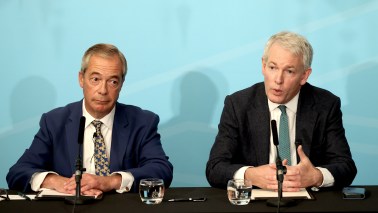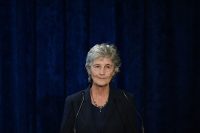There was a poignant bit of the Telegraph’s coverage of today’s happy event: “Everything we know so far after Duchess of Cambridge gives birth to boy”, it promised. Except that’s it. There is very little more to be said except perhaps the weight, 8lb 7oz – it’s at times like this we all revert to imperial measures – and the speed with which the Duchess left hospital, eight hours after the birth. That’s it. That’s all there is to say, except to remark that Kate’s going home dress with its lace collar was interestingly reminiscent of a dress that Princess Diana wore after one of her births, only hers is red, not blue. And the name.
Rarely are so many words expended on an event that requires so few. Once upon a time, when births, including royal births, were a dangerous business, we might need reassurance that mother and baby are well; these days, not only do we take that much, miraculously, as read, the mother is out of the door of the hospital before the nation has got its head around the sex of the baby. It’s a happy event, of course and obviously a cause for rejoicing, but as the Queen’s cousin sagely observed once, “people have babies, don’t they?”
Well, actually, not so much, nowadays. A most troubling aspect of modern life is that women, except for those from very pro-natalist communities like Bangladeshis and Somalis, really don’t have many children. As Stephen Daisley points out, the average output is fewer than two children, 1.79 for each mother, which is better than Italy or Germany but not much. You can blame the cost and scarcity of housing, at least housing with more than two bedrooms, the need for women to strike early on the career ladder, the distance many of us live from our families, which means we don’t have the childcare that grandparents provide in other, happier nations (including this one a couple of generations ago); the perennial reluctance of contemporary men to commit to marriage and parenthood; the difficulty of subsisting on one wage; the environmentalists who insisted that overpopulation was a global scourge, when, in fact, it is really a problem for impoverished parts of the world – and unfortunately it was here rather than in sub-Saharan Africa that the middle classes took the message on board.
Whatever; native Brits (as I say, other communities don’t have quite this problem) don’t have enough children, apart from those unappealing men who marry and remarry and have children by successive wives and girlfriends. I had two; few of my contemporaries managed many more, although most perfectly well could have done. In fact, most of the women I know – educated, articulate, reasonably prosperous, perfectly attractive – would be quite a bit happier if they had had more children. Their lives and careers wouldn’t have ended if they had simply had children as soon as they married or settled down, or even allowed their unplanned pregnancies to come to term. Children make for happiness more than most things in life; my generation did not have enough of them.
Enter Kate Middleton. If there’s one thing she has going for her it’s that younger woman want to imitate her, from her hair to her Reiss dresses and LK Bennett beige shoes. She’s had her third baby; might she, perhaps, have a fourth, like the Queen did? Could she make fecundity fashionable in her circle, like concern for mental health and a positive attitude to homosexuality? She’ll have quite some way to go before coming anywhere near Queen Victoria’s impressive total, but really, she has the space and the time and the childcare. Having a third baby is not just lovely for her; it comes close to doing a national service.








Comments